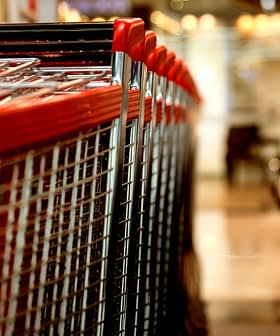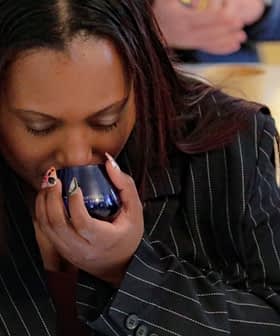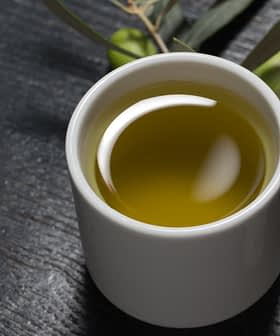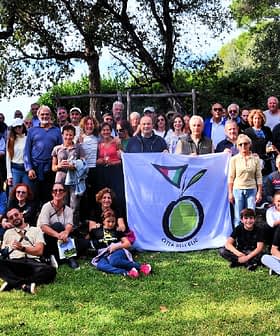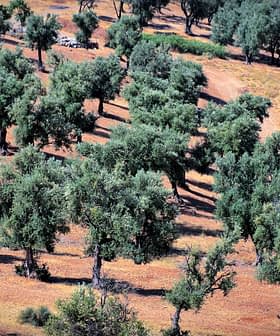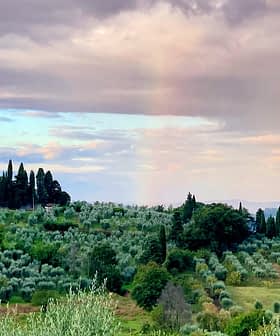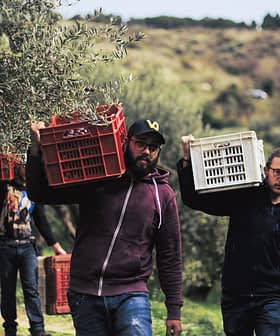Olive Farmers Flee Southern Lebanon as Conflict Escalates
Israel’s escalating air strikes and ground invasion have forced one million people to flee southern Lebanon, many leaving olive-laden trees unharvested.
 Smoke from cross-border shelling rises over the Lebanese southern border villages of Kfar Kila and Adisseh, Thursday, Oct. 3, 2024. (Photo: Stringer/picture-alliance/dpa/AP Images)
Smoke from cross-border shelling rises over the Lebanese southern border villages of Kfar Kila and Adisseh, Thursday, Oct. 3, 2024. (Photo: Stringer/picture-alliance/dpa/AP Images) An Israeli airstrike destroyed the processing and storage facilities of Darmmess, an award-winning olive oil producer in Lebanon, just before the start of the Israeli Defence Force’s ground operation in southern Lebanon. The conflict has killed over 1,300 people and displaced one million, severely damaging the country’s economy and leaving many farmers unable to harvest their olives, leading to significant financial losses and food insecurity.
The processing and storage facilities operated by the award-winning olive oil producer Darmmess in Lebanon were destroyed by an Israeli airstrike.
The attack on the company’s facilities happened a few days before the start of the Israeli Defence Force’s ongoing ground operation in southern Lebanon.
The farmers cannot proceed to the harvest. That means that they will not be able to feed their families this winter.
According to Lebanon’s health ministry, Israel’s bombardment has killed at least 1,336 people since Israel ramped up its attacks against Hezbollah, a political party and militant group with links to Iran, on September 20th.
Twenty countries, including the United States, consider Hezbollah to be a terrorist organization. However, the European Union and several other countries accept the political wing as a legitimate organization.
See Also:An Olive Harvest Under Bombardment in Southern LebanonAlong with the rising death toll, Israel’s invasion has displaced one million people from the south of the country. Satellite data analyzed by the Financial Times show that more than 3,100 buildings have been destroyed.
Meanwhile, the International Monetary Fund anticipates the conflict will severely damage the country’s fragile economy.
“In Lebanon, the recent intensification of the conflict is exacerbating the country’s already fragile macroeconomic and social situation,” spokeswoman Julie Kozack said during a press conference. “The conflict has inflicted a heavy human toll on the country, and it has damaged physical infrastructure.”
For Darmmess founder Rose Bechara Perini, the war arrived squarely on her doorstep four days into the escalation when an airstrike destroyed the company headquarters.
“On September 24, 2024, our processing and storage facility, relocated in a village supposed to be safer as far from the border, was struck by an airstrike, resulting in the total destruction of our equipment and supplies,” Bechara Perini wrote in a message to customers and partners on October 1st.
“The whole facility has been reduced to just one meter of ashes, leaving us in a devastating situation,” she added.
Bechara Perini sent a video of the devastated facilities to Olive Oil Times.
Rose Bechara Perini
Darmmess is a communal project dedicated to organic olive oil production. Bechara Perini said it provides income for many growers in Deir Mimas, situated a couple of kilometers from the Israeli border.
“Most of our farmers fled to Beirut,” Bechara Perini told Olive Oil Times, adding that many Lebanese have struggled to find safe places to shelter amid the conflict.
“Those who did stay in Deir Mimas are those who do not have a place to stay in the capital,” she said. “Adding to that, you do not really know where it is safe and where it is not.”
Reaching the olive groves in Deir Mimas is currently “too risky,” she said. As a result, Darmmess will not be able to harvest olives and produce olive oil in the 2024/25 crop year.
Many of the farmers of the economically depressed region have invested time and money in the current olive season, which will yield nothing.
“In an area of eight square kilometers, Darmmess cultivates approximately 150,000 olive trees, its primary agricultural activity representing the inhabitant’s most significant, and often, only source of income each year. Our olive trees represent subsistence, culture and income,” Bechara Perini said.
“The farmers cannot proceed to the harvest. That means that they will not be able to feed their families this winter,” she added. “The country is already bankrupt and people are becoming poorer and poorer.”
Other Lebanese producers have told Olive Oil Times that fighting in the south has led most farmers to abandon their olive trees. Israeli airstrikes and fighting on the ground have also resulted in olive groves burning, the damage from which is impossible to quantify.
In the latest escalation, the FT analysis of satellite data indicated that 530 buildings had been destroyed along Lebanon’s southern border.
See Also:The Lasting Strain on Israeli Olive Growers Six Months After Devastating AttackHowever, one year of cross-border fire between Hezbollah and Israel has already caused considerable damage.
“Almost 80 percent of the farmers in southern Lebanon will not be able to reach their farmland and to harvest their olive grove,” said Walid Mushantaf, founder of Bustan El Zeitoun. “For the olive oil mills is the same, no way to operate.”
Located in the vicinities of Sidon, 40 kilometers south of Beirut, Mushantaf’s olive farm is still active.
“Few farmers, including myself, are exerting utmost efforts to maximize their daily labor force to collect their harvest as soon as possible once we can secure safe instances,” he said.
“Commuting for workers to get to our farm daily is difficult because of the lack of fuel,” Mushantaf added. “And it is unsafe, considering the air raids and the number of civilian casualties continuously growing.”
After a poor harvest in the 2023/24 crop year, Mushantaf said many producers had anticipated a significant yield.
“Farmers and olive growers worked all the year around waiting for the harvest,” Mushantaf said. “Unfortunately, they are going to lose that harvest. Therefore, they will not be able to cover their daily financial needs because many farmers do not have any other source for living other than farming.”
Meanwhile, in the Bekaa Valley, an eastern Lebanese region home to the country’s first high-density olive grove, Israeli airstrikes are coming closer.
Charbel Jaoude
“They [the airstrikes] are very close, but we are okay,” said CBio Jaode owner Charbel Jaoude. However, he warned that “not all groves and mills are secure, and harvesting is difficult at this time due to a lack of workers and safety concerns.”
The FT analysis of satellite data showed that 210 buildings across several villages have been destroyed across the Bekaa Valley.
Further north of Lebanon, near the village of Kour, some workers are still preparing for the harvest.
“We are so fortunate to be able to harvest our olives,” said Karim Arsanios, the owner of Solar Olives. “Aside from the constant warplanes flying over our heads and hearing the occasional distant bombing, it’s pretty calm.”
“We are in our first week [of the harvest], and despite new daily issues, we’ll keep going until and if it’s unsafe,” he added.
Despite being away from the airstrikes and active combat, the situation has never been so complex.
“Because of the current geopolitical situation, costs associated with the harvest are at their highest, and I think all-time high since I started doing this, about four years ago,” Arsanios said.
“The south has been devastated, and more than 35 percent of the local olive oil production comes from there,” he added. “The country will have a shortage, and prices will probably increase.”
“The situation is very bad,” added Ibrahim Al Kaakour, the owner of Genco Olive Oil. The company, which mills in the north of the country but purchases olives from farmers across Lebanon, has not sustained any damage to its facilities.
However, Al Kaakour confirmed that most trees in the country’s south would be left unharvested. He offered his support to those who were able to harvest. “We offered our services to other producers in the south free of charge,” he said.
Arsanios accused the Israeli army of intentionally using white phosphorous bombs to destroy agricultural areas in the south of the country, referring to one specific episode of Israeli shelling to which the Lebanese government attributed the destruction of more than 40,000 olive trees.
See Also:Olive Trees in Gaza Among Conflict’s Collateral Losses“The land will take months, if not years, to get rid of these chemicals,” Arsanios said. “We are all losing a piece of our shared heritage by killing olive trees, and it breaks my heart.”
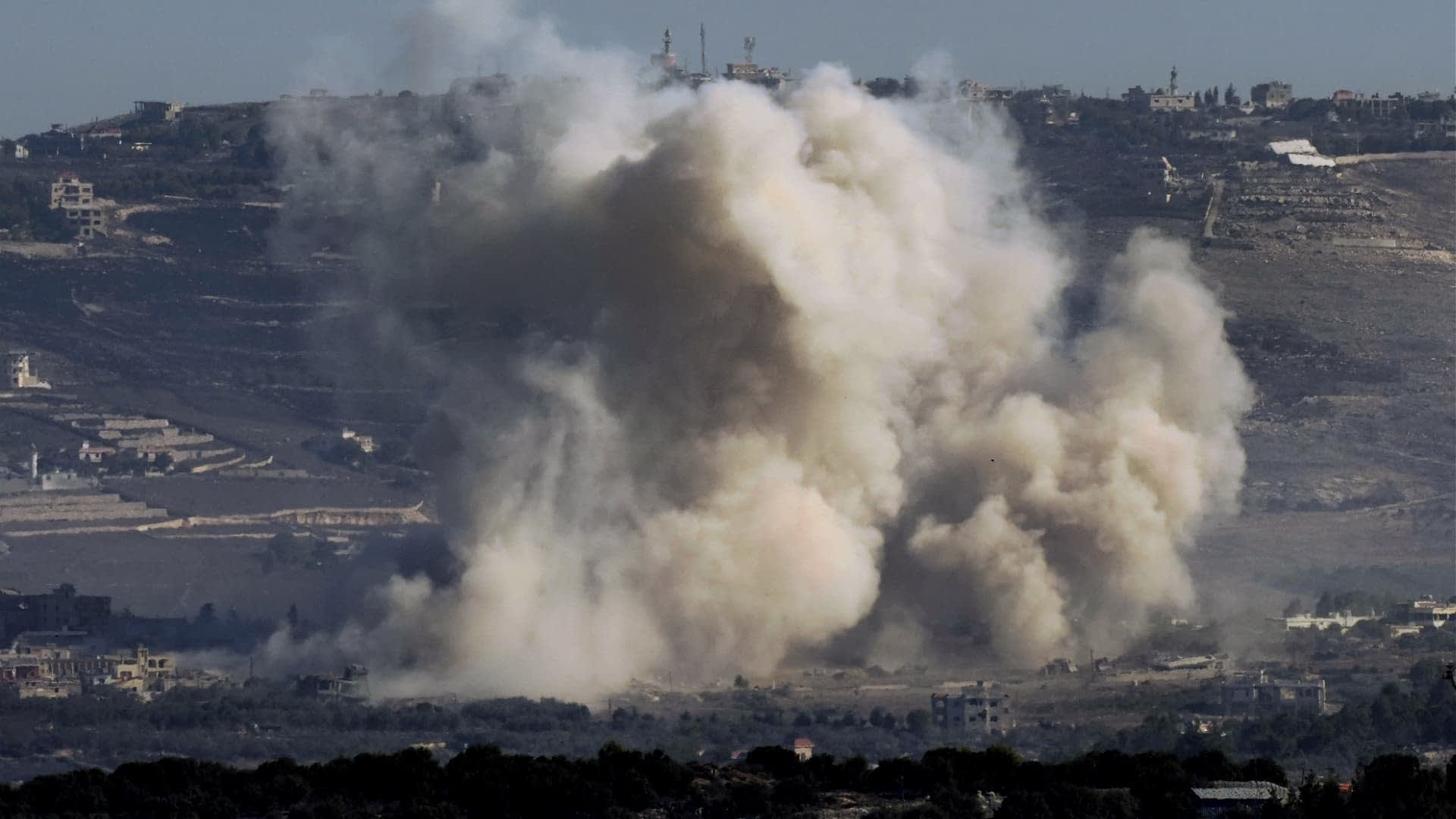
Smoke rises following an Israeli bombardment in southern Lebanon as seen from northern Israel, Friday, Oct. 4, 2024. (AP Photo/Baz Ratner)
The worsening conflict in the region is not only causing deaths and mass displacements, it is also zeroing in a country plagued by a prolonged economic crisis.
“The gasping economic activity that we had started to see has, once again, completely stopped,” Arsanios said. “When this dark chapter is over, Solar will offer all the help it can offer.”
“The only thing keeping this country together after all the mediation incurred by external countries over the years is the solidarity between its people,” he added. “That’s the backbone of our country, and nothing will be able to break that.”
Despite the tragedy unfolding in Lebanon, Becahara Perini said Darmmess’s mill in Deir Mimas and the olive trees remain intact, and she will return to rebuild as soon as possible.
“We promise we will rise again,” Bechara Perini added in her note. “In preserving this ancestral heritage, we celebrate not just the fruit of the olive tree but the enduring spirit of our community.”
Olive Oil Times contacted the Israeli authorities for comment, but no response was received as of publication.
The Israeli Defence Force has said the bombing campaign and ground invasion are meant to push Hezbollah north of the Litani River and allow 60,000 displaced Israelis to return to their homes in the north of the country.
Share this article


